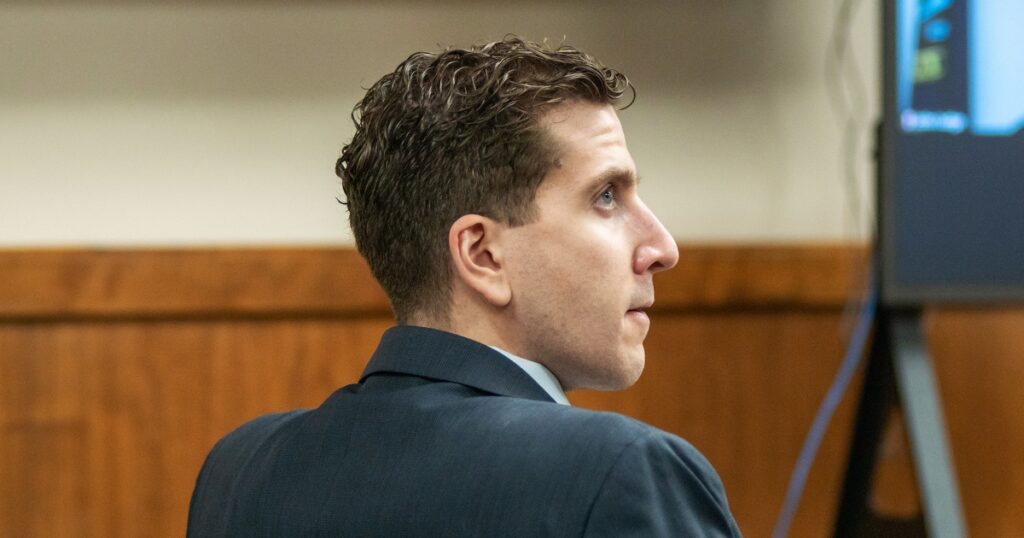
BOISE, Idaho — With the trial against the man accused of murdering four University of Idaho students four months away, a judge is set to hear arguments Wednesday over court motions that will shape the proceedings and, if successful for his defense, remove the death penalty as punishment.
Prosecutors and the defense for suspect Bryan Kohberger, 30, have clashed in court filings over what should be admissible, sharing new information that has filled in some gaps since the killings in late 2022 stunned the college town of Moscow. A sweeping gag order in the wake of the students’ deaths has prevented many attached to the case from speaking publicly.
Kohberger is accused of fatally stabbing housemates Madison Mogen, 21; Kaylee Goncalves, 21; and Xana Kernodle, 20; as well as Kernodle’s boyfriend, Ethan Chapin, 20, with a large fixed-blade knife at an off-campus home on Nov. 13, 2022.

Latah County prosecutors have said they intend to seek the death penalty if Kohberger is convicted. In recent days, the state has also added another member to its team: Josh Hurwit, the U.S. attorney for the District of Idaho under former President Joe Biden.
Among the revelations in recent weeks is that Kohberger has been diagnosed with autism spectrum disorder. His lawyers wrote that his autism has “significant impact on his daily life,” and that jurors may unfairly scrutinize his reactions in court as he maintains a “flat affect” and “does not show emotion on his face,” among other attributes.
“Due to his ASD, Mr. Kohberger simply cannot comport himself in a manner that aligns with societal expectations of normalcy,” his legal team argued in calling for the death penalty to be stricken as a sentencing option. “This creates an unconscionable risk that he will be executed because of his disability rather than his culpability.”
Prosecutors responded in a filing that Kohberger was shown to be diagnosed with the least severe form of autism that comes “without accompanying intellectual or language impairment,” and that he has failed to show his diagnosis “would in any way make him less culpable for murder.”
Experts have said challenging the death penalty can be difficult in Idaho, where the law does not allow defendants to mount an insanity defense in criminal cases.
But defendants in other high-profile trials have been successful in getting the death penalty dismissed, including “doomsday mom” Lori Vallow, who was convicted in 2023 in the deaths of her two children and her husband’s first wife. A judge removed the death penalty in her case due to late disclosure of evidence by state prosecutors.
Idaho has not executed anyone since 2012, but legislators legalized death by firing squad as an option in 2023 amid a shortage of lethal injection drugs.
Both prosecutors and the defense are also expected to spar over descriptions of Kohberger that they want avoided at trial.
Prosecutors intend to show a smiling selfie of Kohberger, which they say was taken roughly six hours after the students were killed, in order to help jurors determine whether the suspect has “bushy eyebrows.”
That facial feature was provided to police by one of two housemates who survived the night of the killings and said she saw a masked intruder dressed in black walking past her.
But Kohberger’s defense team is seeking to exclude any evidence referring to “bushy eyebrows,” arguing it would be “unfairly prejudicial” to jurors.
The defense also doesn’t want the state to refer to Kohberger as a “psychopath” or “sociopath,” or use the term “murderer” or other variations of that word.
In turn, prosecutors want Ada County Judge Steven Hippler to prohibit the defense from presenting testimony on the neurological and psychiatric evaluation of Kohberger; bar the defense from providing alibi evidence that isn’t given directly by Kohberger; and disallow the defense from offering “alternative perpetrator” evidence or argument without first proving that it is relevant.
Another key element at trial may be text messages the surviving roommates sent to one another prior to calling 911. That call wasn’t made until eight hours after the killings. The texts highlight a chaotic early morning in which the two roommates tried unsuccessfully to call the others who were on separate floors of the home.
“I’m so freaked out,” one of them wrote.
The defense said in a filing that the messages the prosecution wants to include are selective, and that the surviving roommates were also on social media and “were not asleep for 8 hours,” according to phone records.
The defense had previously said in court filings that there is “no connection” between Kohberger and the students, and that other men’s DNA was also found at the scene.
How DNA evidence may be used at trial could also emerge at Wednesday’s hearing. Authorities say DNA was found on a knife sheath at the crime scene and is a statistical match to Kohberger’s.
In a court filing, Latah County Prosecutor Bill Thompson wrote that a defense expert’s disclosure revealed that Kohberger’s lawyers won’t challenge that the DNA found on the sheath belongs to the suspect. Instead, Thompson wrote, “the defense plans to argue the DNA on the knife sheath does not prove Defendant was ever at the crime scene and the knife sheath itself could have been planted by the real perpetrator.”
Prosecutors said in recent court documents that Kohberger purchased a Ka-Bar knife from Amazon eight months prior to the murders, and it was that same type of knife sheath found on the bed next to Mogen’s body. The murder weapon had not been recovered, Moscow police have said.
Other motions surrounding Kohberger’s online purchases, the apparent capturing of his car on surveillance videos and the prosecution’s planned use of a 3-D model of the victims’ home may also be discussed Wednesday. The hearing could also continue into Thursday.
Shanshan Dong reported from Boise and Erik Ortiz from New York.
 Latest World Breaking News Online News Portal
Latest World Breaking News Online News Portal






